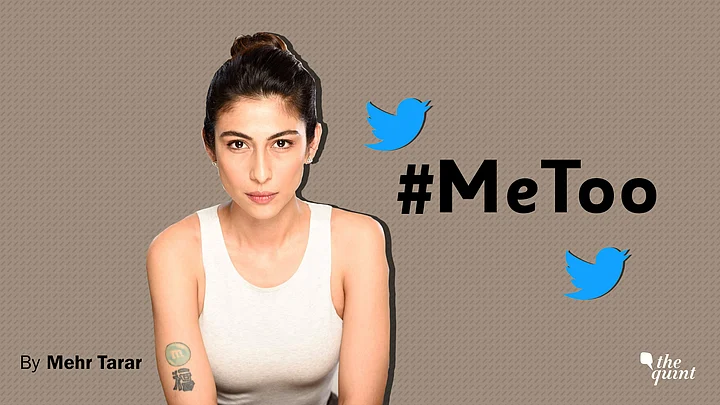On 19 April, Twitter in Pakistan went into overdrive when renowned singer-actor Meesha Shafi posted her #MeToo statement accusing Ali Zafar, arguably one of Pakistan’s most popular celebrities, of sexual molestation. The expected ensued.
Amidst the outpouring of support for Meesha from various groups, including female politicians, journalists, feminists, human rights activists, bloggers and social media activists, Ali’s issued a statement denying the allegations.
Ali also announced that he would be filing a case against Meesha.
Justifying Harassment of Woman Through Religion
What I saw on Twitter the following day may have been very disturbing for those who have never experienced the sordidness of virtual commentary and character assassination by strangers, but it wasn’t anything new for me. I’ve seen it happen to me, and I’ve seen it happen to many people – of both genders – on Twitter.
It is ugly, it is vicious, and it is a mirror to societal perceptions, sensibilities and mindsets towards women.
The brevity of a tweet does not hide the almost absoluteness of the parameters in which a woman is supposed to exist, work, appear to be and just be.
In a 280-worded sanctimonious advice or a smug verdict, lives are dissected to a bare minimum of right and wrong as per the moral and religious sensibilities of those who feel entitlement to other people’s lives, through the utterly fascinating and equally bewildering power of virtual connectivity.
Among the brave voices of those – Momina Mustehsan, the singer, being one – who came forward with their own stories and countless women and men who rallied in support of Meesha, there is no denying the existence of the other side of reality. The very real lines that define and delineate female behaviour in the eyes of a large number of people who, by claiming to follow cultural boundaries set by religion, fail to understand the very fundamentals of religious edicts for women.
Too busy to read? Listen to it instead.
There is no place for insinuation, slander and shredding of reputation in Islam, and there is no place for disrespecting women to prove a point, or to save a man’s reputation.
Braving Online Trolls to Make Your Voice Heard
Let me make a disclaimer here: I do not condone or practise Twitter-shaming of anyone, be it someone who has personally harmed me, or a loved one, an acquaintance or a complete stranger.
And although Twitter is a huge part of my communication as a columnist and writer, and as a woman who has an opinion on any and everything (and I share what I call shareable stuff about my personal life on Twitter), I draw a line when it comes to fighting personal battles on Twitter. Online lynch mobs jolt my notions of humanity. But that is in no way a judgment on those who use their personal story to be part of the bigger picture.
I understand and respect the need to have a platform where voices from across the world, beyond borders, beyond ideologies, beyond social restrictions, come together as a collective force to say NO MORE. Individual voices would be redundant to take the story forward if more and more do not become a part of it. United we stand.
To break the age-old tradition of silence, of shame, delineated by society, of keeping the pain within, of learning to wrestle with ghosts of unresolved trauma, unspoken fears, and of ignoring the undesirable, thinking it is no big deal – words that are blatantly and subliminally imparted by family, community, society.
Meesha Shafi’s ‘Demonisation’
Moreover, it is in no way an implication that all men indulge in obnoxious behaviour, or that all accusations of harassment or molestation are authentic. There have been cases of women falsely accusing men of sexual misdemeanours after an ugly break-up, divorce or firing from a job. This is also not an endorsement of categorical support for everyone who comes forward with an allegation of harassment: not all accusations are true.
Attacks on Meesha are in no way a reflection of who she is, what her achievements are, or even what the merit of her allegation is. To even assume that in a blatantly patriarchal and gleefully misogynistic society like ours, a woman celebrity would risk her personal and professional reputation to accuse a huge star of sexual molestation – it is preposterous.
Harassment in most cases does not have solid evidence beyond the she-said-he-said. There is hardly ever any concrete proof of a man groping, touching inappropriately, or even forcing sexual acts on a woman.
The virtual demonisation of Meesha Shafi is not just by men, it is also by women.
Vicious commentary on Meesha’s looks, posting her glamorous and sexy (as per standards of sexiness in an Islamic country) photos, her photos with Ali – the man she has accused of molestation – and conjuring of theories turning a #MeToo statement into a sinister ruin-a-star plan is all simply a stark look into societal attitudes towards women.
And it is ugly as hell.
(The author is a senior Pakistani journalist and tweets from @MehrTarar. Views expressed are personal. The Quint neither endorses nor is responsible for them.)
(The Quint is now on WhatsApp. To receive handpicked stories on topics you care about, subscribe to our WhatsApp services. Just go to TheQuint.com/WhatsApp and hit send)
